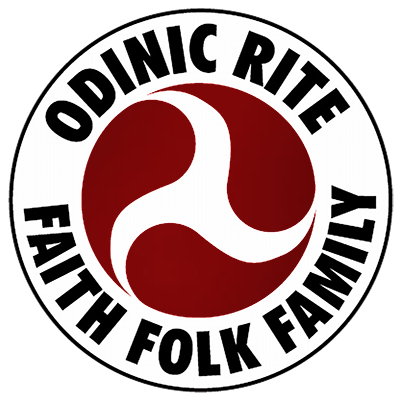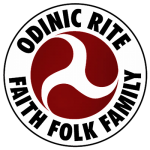The purposes of blot or ritual are many. They are times when we very consciously hail the Gods and ancestors. Times when we consciously know of our link, biological and spiritual, with them. Time when we can realise our belonging and contact the Gods, Ancestors and folk soul. We realise and feel the forces of the universe, of Creation and while we are individuals, know we are linked to our Gods and folk and to all creation. They also remind us of our duties and responsibilities to our Gods, folk and land.
You will see that the Odinic Rite blotar have a definite structure. They open with the sounding of the Moot Horn sounded North, East, South and West. This has several purposes. It signals the blot has begun and idle chatter, fidgeting etc. should cease as we prepare for a holy act. It calls the Gods and spirits to be with us, and honours them. To the sound of the horn we rally physically and spiritually.
Next comes the Cleansing whereby we stand in silent meditation to still our mind and further prepare ourselves for the blot.
Following this comes the Hallowing, which declares the place of worship to be a holy place and we ask that we may realise the divine powers we have within us. The sacred fire continues this and also acts as the symbolic flame of our Faith and Folk which ever burns. It can also be a focal point whereby we are all linked by this flame.
There follows the Invocation which relates to the particular festival being celebrated or the purpose of the ritual. In it we give honour to our Gods.
The First Reading (often Poetic) reminds us that Odin is the God of Poetry and inspiration and that such has always had a special place in the achievement of our people and in Odinic worship.
We next further remind ourselves of the importance of the Ancestors and Successors and our duty to them. We reiterate our knowledge in the unity of past, present and future and we address ourselves to our descendants, those generations of our folk yet unborn. We remember we are guided by and brought to where we are now by the past actions of our kin and that it is what we do now which effects the future.
The Rede is mainly directed to ourselves reminding us of our responsibilities to the Gods, folk and land. The Second Reading, as with the first, emphasises the genius of our Folk in the usage of language via the written word. This reading again should reinforce an aspect of the blotar and hails the ability of an individual gifted with the ability to impart wisdom, ideas and philosophy via writing, a powerful form of communication.
The Gealdor helps us “send” our intent. It is a very important part of the blot where we are linked in sound and the energy of sound. It is usually at this point in the blot that professions etc. or special readings are performed.
Next comes the Petition – a call to the Gods to be with us in our efforts to maintain standards. To aid us in our endeavours to defend the faith and family. To help us be constructive, to have “healer’s hands” and wisdom and that we may stand in comradeship with our fellow men and woman.
The Jarl’s Rally reminds us of the ring of loyalty that should link those who lead and those who follow.
The Memory Cup is our sacrifice of mead and the symbolic communion with the Gods. Finally comes the Troth, where we declare our pledge to Gods and Folk.
Variations or additions to this basic structure occur at certain festivals, for example the presentation of the Corn tokens at the Charming of the Plough.
Taken from The Book of Blotar of the Odinic Rite.

